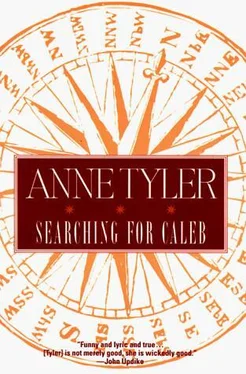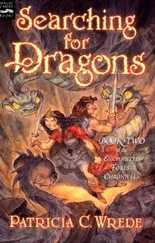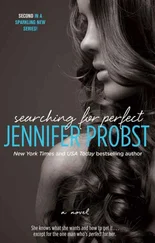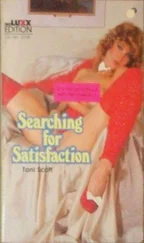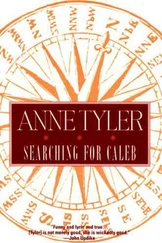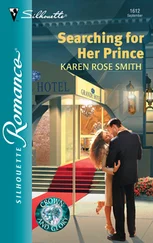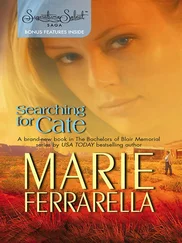Anne Tyler - Searching for Caleb
Здесь есть возможность читать онлайн «Anne Tyler - Searching for Caleb» весь текст электронной книги совершенно бесплатно (целиком полную версию без сокращений). В некоторых случаях можно слушать аудио, скачать через торрент в формате fb2 и присутствует краткое содержание. Жанр: Современная проза, на английском языке. Описание произведения, (предисловие) а так же отзывы посетителей доступны на портале библиотеки ЛибКат.
- Название:Searching for Caleb
- Автор:
- Жанр:
- Год:неизвестен
- ISBN:нет данных
- Рейтинг книги:5 / 5. Голосов: 1
-
Избранное:Добавить в избранное
- Отзывы:
-
Ваша оценка:
- 100
- 1
- 2
- 3
- 4
- 5
Searching for Caleb: краткое содержание, описание и аннотация
Предлагаем к чтению аннотацию, описание, краткое содержание или предисловие (зависит от того, что написал сам автор книги «Searching for Caleb»). Если вы не нашли необходимую информацию о книге — напишите в комментариях, мы постараемся отыскать её.
Searching for Caleb — читать онлайн бесплатно полную книгу (весь текст) целиком
Ниже представлен текст книги, разбитый по страницам. Система сохранения места последней прочитанной страницы, позволяет с удобством читать онлайн бесплатно книгу «Searching for Caleb», без необходимости каждый раз заново искать на чём Вы остановились. Поставьте закладку, и сможете в любой момент перейти на страницу, на которой закончили чтение.
Интервал:
Закладка:
Their furniture was barely enough to make the house seem inhabited: three rust-stained mattresses, four kitchen chairs from Goodwill, Great-Grandma's hand-carved rosewood dining table, a sagging sofa and easy chair donated by a neighbor two moves back, and three bureaus of Justine's mother's, their ornate feet and bow fronts self-conscious next to the bedsteads Duncan had constructed out of raw pine boards that gave off a yellow smell. For dishes they had a collection of dimestore plates, some light green, some flowered, some dark brown with white glaze dripped around the edges, and thermal mugs given away free when Esso changed to Exxon. The cutlery with its yellow plastic handles had been salvaged from Aunt Sarah's English picnic basket. There were two saucepans and a skillet. (Justine did not like cooking.) They owned a broom and a sponge mop, but no dustpan, no vacuum cleaner, no squeegee, scrub bucket, or chamois cloth. (Justine did not like cleaning either.) No washing machine or dryer. When all the clothes in the house were dirty the family would lug them to the laundromat. Of course that was not much fun-the four of them struggling with their bulging pillow slips, the grandfather's head ducked way, way low in case of passers-by, all of them a little bedraggled in their very last clean clothes unearthed from the bottom of the drawer or the back of the closet-but wasn't it better than moving those shiny, heavy appliances from place to place? Why, by late afternoon they were completely settled in. There was nothing more to do. It was true that most of the boxes remained to be opened but that was nothing, some were still packed from the last move. There was no hurry. Justine was free to stretch out on her mattress, which had the piney-wood smell of home, and work her feet from her shoes and smile at the ceiling while the cat lay on her stomach like a twenty-pound, purring hot water bottle. Duncan could sit on the edge of the bed fooling with a stroboscope he had forgotten he owned. Meg could shut her door and unwrap, from its own special box, from seven layers of tissue paper, her framed photograph of a young man in a clerical robe at least a size too large, which she rewrapped almost immediately and slid to the back of her closet shelf. And in his room across the hall the grandfather could take a photo of his own from his pocket: Caleb Peck in tones of brown, framed in gold, wearing a hat and tie, his face stark and dignified, playing a violoncello while seated in an open stable door twenty feet off the ground.
Duncan took a tour of the Blue Bottle Antique Shop with Silas Amsel, the owner. Since he had already seen it when he applied for the job, he was not very interested. He ambled along behind fat, bearded Silas, yawning and drumming his fingers on passing tabletops. Spider-legged spinet desks, clocks with cherubs and shepherdesses and Father Time, dusty goblets, mirrors framed in knobby gold plaster, occasional tables too weak to bear the weight of a lamp-what was the sense in all this? To tell the truth, he had never thought about antiques before. He had been reared in a world where they were taken for granted. No one ever bought them, no one bought anything; the rooms were crowded with mellowed, well-kept furniture that appeared to have grown there, and whenever children departed they took several pieces with them but left the rooms as crowded as ever, somehow, as if more had sprouted in the night. No, what interested Duncan was the bin of contrivances he had found behind Silas's counter: rusty cherry pitters, potato quillers, apple corers, fish sealers, an ingenious spiral cone for separating the white of an egg from the yolk. Beside the bin was a wicker valise that opened to make a chair for sitting by the seashore. Where had all that inventiveness got to, now? How had it faded away? The bin was marked with a felt-tip pen: Your choice, $1. The valise, which was broken, could be bought for $2.50, if anyone could find it among the boots and paper bags. When Duncan took over, he would put the valise in the front window. (He leered suddenly at Silas's broad, ponderous back.) He would polish the utensils and lay them out in rows. He would sell everything humdrum and buy ancient tools at barn auctions and flea markets, until the shop resembled a nineteenth-century inventor's workroom and he could sit inhaling a combination of machine oil and wood and oxidizing iron, his favorite smells.
"Oh, I'm getting old, getting old," said Silas, creaking up the steps at the back of the store to show him where the telephone was. "Be sorry to let loose of the reins but glad of the rest, believe me."
In fact Silas was a good thirty years younger than Grandfather Peck, who could have run the shop with one hand tied behind him, but Duncan was used to this premature aging among people outside the family. Besides, if Silas weren't retiring Duncan would still be looking for a job. He had thought, this time, that he might finally have used up all his mother's relatives. He had wondered if he would ever escape from the health food store, which he had turned into a paying proposition and then, out of boredom, allowed to run down again. Weevils took over the stone-ground wheat and mold got the soy grits and the unsulphured raisins turned to pebbles. He lost his natural gaiety and his recklessness, he fell back on bourbon, solitaire, and a flat-faced silence that not even Justine could penetrate. Was there anything worse than feeling you were sealed in a place, to grow old and stale and finally die? His careless bookkeeping and erratic hours, already a matter of principle, became so obvious no employer could overlook them. That was the pattern of Duncan's life-ventures begun light-heartedly, with enthusiasm but only half his attention, the other half devoted to plans for a perpetual motion machine made entirely of screen door springs or a method of breeding stingless honeybees or the entering of a contest, sponsored by an Englishman, for a one-man flying machine no bigger than an armchair. In the last twenty years he had been, among other things, a goat farmer, a photographer, and a cabinetmaker; he had worked in a pet store, a tobacconist's, a record bar, and a gourmet shop; he had taken census, shorn sheep, and fertilized the lawns of a suburban development on a toy tractor. Almost all these jobs had been enjoyable, but only briefly. He began to grow restless. He noticed that he was treading an endless round of days just as his pinched, unimaginative family had done before him. He would start going to work at ten and then eleven, four days a week and then three; and next came the bourbon, the solitaire, the silence in which to reflect upon the bars of his cage.
Next another venture. He was his own perpetual motion machine.
Sometimes he worried about Justine. He didn't want to be the way he was, uprooting her yearly or even more often, switching Meg to still another school. He knew how the neighbors shook their heads over him. Yet it seemed he suffered from some sort of chronic dissatisfaction which came and went like malaria, and the only way to hold it back was to learn more and more new facts, as if continually surprising his mind. Now peculiar scraps of knowledge were stuck to him like lint from all his jobs. He knew a Toggenburg goat from a Saanen, he could measure a dachshund, by sight alone, for a plaid mackintosh with matching Sherlock Holmes-style hat. He was an authority on the making of yogurt and the application of poisons to broad-leafed weeds during dandelion season. He had also discovered that every shop, even the most unlikely, has a circle of daily customers who become its experts-the elderly gentlemen capping each other's list of imported cheeses, the ladies debating on the use of slippery elm bark, the teenagers intoning the life history of every member of every rock band. At the tobacconist's, college boys could spend hours recalling the time a legendary freshman had found a fully aged and yellowed, hand-carved meerschaum pipe sitting on the top of someone's garbage can. Perched on his stool behind the counter, gloating over the drawings for his pedal-driven flying machine, Duncan absorbed this stray knowledge like sunlight. Never mind that it was useless. And now he was about to find something else to learn, here among these ancient navigating devices and cracked foggy lanterns and ropes of amber beads like half-sucked butter rum balls.
Читать дальшеИнтервал:
Закладка:
Похожие книги на «Searching for Caleb»
Представляем Вашему вниманию похожие книги на «Searching for Caleb» списком для выбора. Мы отобрали схожую по названию и смыслу литературу в надежде предоставить читателям больше вариантов отыскать новые, интересные, ещё непрочитанные произведения.
Обсуждение, отзывы о книге «Searching for Caleb» и просто собственные мнения читателей. Оставьте ваши комментарии, напишите, что Вы думаете о произведении, его смысле или главных героях. Укажите что конкретно понравилось, а что нет, и почему Вы так считаете.
